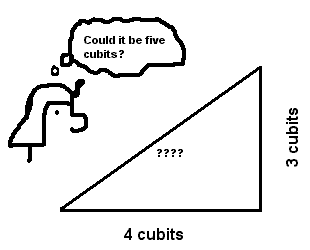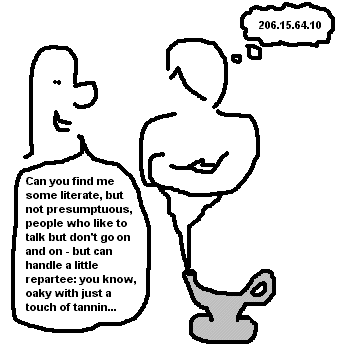|Feedback To Author |
Feedback To Webmaster
Copyright © 1998 by Birrell Walsh. All Rights Reserved
Metric and Magic, Knowledge and Servants
By Birrell Walsh
There seems to be a trade-off in daily experience, between
what I call "magic" and its opposite, "metric."
It is relevant to us now because the World Wide Web has spun a
magic of its own, a magic that involves vanishing metrics and
invisible servants.
A metric is the way that distance is measured in a space. To
know the metric in a place is to be able to find your own way
around. The Web has taken the metric out of our own hands and
put it in hands of servants.
In ordinary space there is an invisible grid that educated
persons have inherited from Descartes. In that jungle gym of rectilinear
grid lines we measure distance by a process we all laboriously
learned in high school as the Pythagorean theorem. The formula
converts shadows on the grid lines into a number that measures
the distance traveled: x ^ 2 plus y ^ 2 = d ^ 2.

It's a clumsy formula, not particularly intuitive, but people
since ancient Egypt have relied on it to measure distances. Mathematicians
more recently have declared that the Pythagorean formula is just
one of many ways to measure distances between two points, but
they all share one thing: for a bit of work, you can figure out
how to get someplace.
There's always been another way to travel for human beings,
however -- the magical way. On magical journeys you do not calculate
distances and directions; instead you know secret names. Knowing
the name of something gives you power; not knowing the name makes
you powerless, and at the mercy of those who do.
The magic that the Web has woven is just that: it has replaced
the metric of Descartes and Pythagoras with the magic of names.
You do not find a location on the Web by tracking through an invisible
jungle gym of coordinates. Instead you find it by knowing its
name. To tell someone the name of a Web site is to tell them how
to reach it.
In fact there are measurable and metric connections between
our computer and the Website whose contents we summon. But we
do not know the pathways and the distances involved. Only invisible
servants who live inside the computer know those pathways and
communicate with their fellows to do our bidding. We're much like
the former president who did not know about bar codes, because
he had not done his own shopping.
 For all
the power the master seems to have to give orders to a servant,
for all the authority that a mistress ever exercised when she
gave commands to a house maid, there was a hidden price. That
cost was the master and the mistress did not know how to perform
the work they commanded. They could only decree it by name. Their
power was like magic.
For all
the power the master seems to have to give orders to a servant,
for all the authority that a mistress ever exercised when she
gave commands to a house maid, there was a hidden price. That
cost was the master and the mistress did not know how to perform
the work they commanded. They could only decree it by name. Their
power was like magic.
And so is ours. We tell our machine to summon information from
a far place, and it does. We do not know how it performs the task.
We do not know what happens downstairs,
where the servants dwell. Do they speak to the servants of other
households? Do they share cookies
and gossip about their masters and mistresses? Which of our
secrets are common knowledge below the stairs in many houses?
A metric, on the other hand, is of use only to persons who
would do their own work. It is the sort of tool that fits in a
worker's hand. And like any laborer's tool, its use involves exertion.
To know the pathway by which information comes to us is laborious.
To decipher a message header is not perhaps the work of the gentry.
But not to know how to decipher a message header is to
remain dependent on the goodwill of servants whose names we do
not even know.
All magic involves invisible servants. The mistresses, the
masters give commands and say the magic names. The servants calculate,
measure, lay out the pathways, make the journeys, retrieve the
treasure, and return to us anonymously. Because they are servants
and we are gentry, we're proud not know how to do this work. The
Web has enabled us to do magic.
And so, like all magicians and all gentry, we are at the mercy
of our servants.

 For all
the power the master seems to have to give orders to a servant,
for all the authority that a mistress ever exercised when she
gave commands to a house maid, there was a hidden price. That
cost was the master and the mistress did not know how to perform
the work they commanded. They could only decree it by name. Their
power was like magic.
For all
the power the master seems to have to give orders to a servant,
for all the authority that a mistress ever exercised when she
gave commands to a house maid, there was a hidden price. That
cost was the master and the mistress did not know how to perform
the work they commanded. They could only decree it by name. Their
power was like magic.